Photo by Sophie Beckman
Over 34,000 Palestinians have been killed since Oct. 7, when Prime Minister Benjamin Netanyahu declared that Israel is at war on Gaza. In January, after months of nonstop bombardment, the International Court of Justice ruled Israel’s attacks as a plausible genocide.
But you wouldn’t know any of this if you listened to Stony Brook University’s (SBU) administration.
University President Maurie McInnis has released five statements since Oct. 7. She has used vague language alluding to a “conflict” between Israel and Gaza. She condemned antisemitism, but mentioned Islamophobia as an afterthought. The last time McInnis issued a public statement discussing the situation was on Dec. 11, following the congressional testimonies of Harvard, MIT and University of Pennsylvania’s presidents. McInnis’ statement condemned calls for the genocide of Jewish people, but didn’t mention Palestinians — instead she said, “any other group.”
The United Nations Relief and Work Agency for Palestine Refugees (UNRWA) has been sharing situation reports nearly every single day since Oct. 7. According to the most recent report, over 75% of the population in the Gaza Strip has been displaced following Israel’s intense and constant attacks. “More than 1 million women and girls in Gaza have almost no food, no access to safe water, latrines, washrooms, or sanitary pads, with diseases spreading amid inhumane living conditions,” the report stated.
“How much longer must we endure this wretched plight?” an 80-year-old refugee from Northern Gaza said in a report published on Feb. 21. “How much longer will our lives be defined by perpetual uncertainty and relentless specter of death?”
Journalists in Gaza have been massacred on the frontlines while attempting to publicize the reality of the ongoing Israeli attacks. According to the Committee to Protect Journalists, more than 90 Palestinian journalists have been killed since Oct. 7. Photographer and journalist Motaz Azaiza has over 18 million followers on his Instagram profile in which he has reported gruesome accounts of the death and destruction caused by the Israeli Defense Forces (IDF). Azaiza evacuated Gaza after 107 days of watching friends, family and loved ones being killed by the relentless bombing.
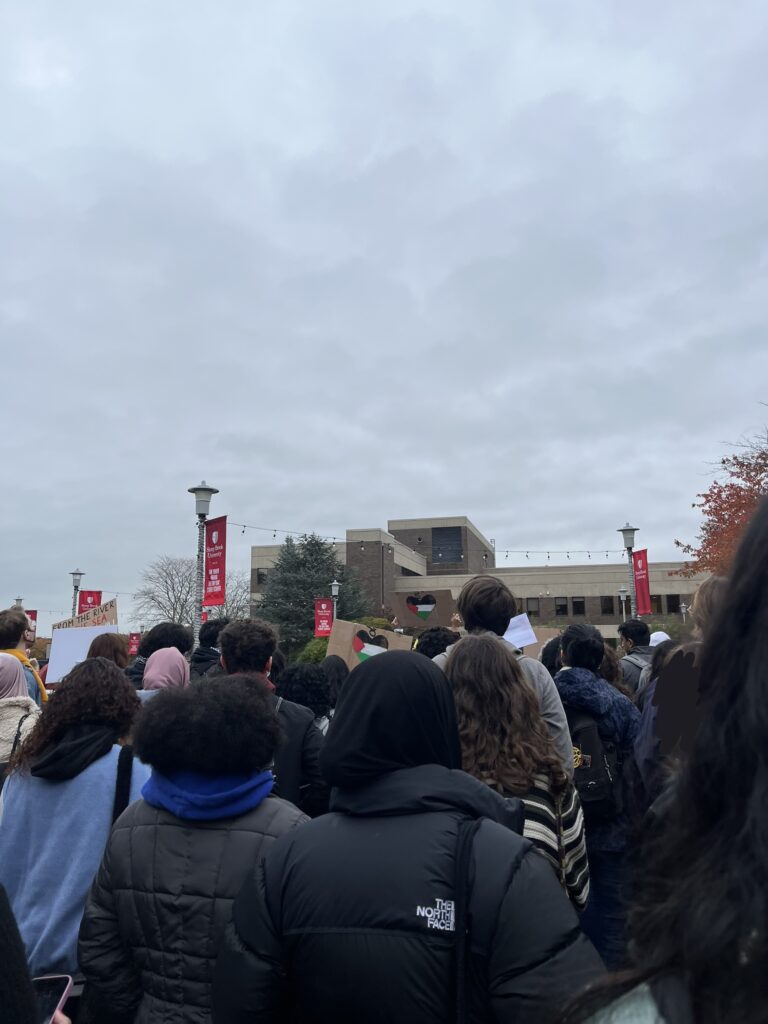
While SBU’s administration remains silent, student-led groups are the loudest voice supporting Palestinians on campus. SB4Palestine is a coalition of students that has done work like organizing protests, creating educational resources and holding memorials for the Palestinians who have been killed in Gaza and the West Bank. Yet despite their pivotal work, the university has not yet recognized them as an official club. Senior Namal Fiaz is the organization’s president and one of the founding members. “Last semester, my friends and I started from scratch,” Fiaz said. “We realized that if we don’t organize on campus, nothing is going to be done.” SB4Palestine has since grown, with almost 2,000 followers on Instagram, and each of their demonstrations are attended not only by dozens of students, but also by several professors and faculty members.
Fiaz and other members of SB4Palestine are also organizers of a SUNY-wide initiative for Boycott, Divestment and Sanctions (BDS) under the national BDS movement. The national movement, founded in 2005, brings awareness to Israel’s persistent violations of international law. Almost 20 years later, the BDS movement remains steadfast in its mission to fight for the rights of Palestinians and end Israel’s occupation of the Gaza Strip and West Bank.
On Friday, Feb. 23, SUNY BDS organizers received a cease-and-desist letter from SUNY lawyers for the organization’s connection to the SUNY trademark. A New York Post article called the group “rogue” and “left unchecked to spew its hatred.” To avoid further connection with the SUNY system, the organization’s website now displays that the “SUNY” in SUNY BDS stands for “Stop Unbearable Neoliberal Yuppies.”
“If we’re getting this kind of censorship, that means we’re doing something right,” Fiaz said. “I’m not afraid of the intimidation tactics that come from the Stony Brook administration or New York State.”
The goal of SUNY BDS is for all 64 SUNY campuses to boycott businesses economically connected to Israel and to ultimately push schools to completely divest from Israel altogether. According to their website, an example of SUNY’s ties to Israel includes a partnership between Stony Brook and IBM, a company that contributes to Israel’s military.
“SUNY BDS was started by a bunch of organizers from here at Stony Brook, the University at Albany and the University at Buffalo,” Fiaz said. “We’ve slowly expanded from those three schools to 50 of them, which is amazing. This is the most urgent thing we can do right now, to make sure that our tuition money stops going toward genocide. We divested during South African apartheid, and we will divest again, I know it.”
On Thursday, April 18, the Undergraduate Student Government (USG) voted 15-6 — with 3 other voters abstaining — to pass a resolution to “Advocate for the Implementation of a BDS Plan in Solidarity with Palestinian Human Rights” — a huge step toward SBU ending its ties with Israel’s occupation in Gaza. In an Instagram post, SB4Palestine stated, “The fight isn’t over, we are here for the long haul. We will free Palestine within our lifetime!”

Similar to the work that SB4Palestine is doing now, SBU students were equally as passionate about divesting from South African apartheid. In 1985, the SUNY Board of Trustees approved a resolution in a 9-4 vote to divest all of SUNY’s funds from South African assets. An article from the League of Revolutionary Struggle archives describes how students organized rallies and sit-ins in the administration building to demand divestment.
Pro-Palestine student groups across the U.S. have not been supported by university administrations. Instead, these groups have been faced with Islamophobia, censorship and blatant, violent hate crimes on their own campuses.
On Jan. 19, students holding a pro-Palestine rally at Columbia University were attacked and sprayed with a chemical weapon, known as skunk or skunk water, by two individuals. Al Jazeera reported in 2021 that skunk was developed as a crowd control weapon by an Israeli company called Odortec. It has been used on Palestinians in the West Bank by the IDF, and it causes side effects like intense nausea, vomiting and skin irritation.
“We know some of the people who were affected,” Fiaz said. “They see their attackers on campus every single day. The administration has done absolutely nothing about it. The students that were skunk-sprayed faced side effects for weeks after that. The administration at Columbia is turning a blind eye.”
Recently, over 100 pro-Palestine demonstrators at Columbia University were arrested after the university President Minouche Shafik called upon the New York Police Department (NYPD) against Columbia’s own students. NYPD removed the protestors engaging in a peaceful movement in the lawn of the campus, which organizers called a Gaza Solidarity Encampment. According to the Columbia Spectator, NYPD arrived in full riot gear, forcibly carried demonstrators, and loaded them onto correctional facilities buses in the “largest instance of mass arrests to be made on campus since 1968” — when students protested against the Vietnam War.
The rampant suppression and the weaponizing of police forces against students continues to escalate across universities, resulting in arrests and suspension. Several universities like Columbia have banned pro-Palestine groups on their campuses. While the Stony Brook administration has not gone that route, students have instead faced censorship.
On Thursday, Feb. 22, SB4Palestine held a demonstration to call for the termination of SBU’s contract with Starbucks. They held a banner in the Melville Library and the Union that read, “Union Busting Is A Crime”— referencing Starbucks’ mistreatment of employees who have spoken up for Palestine. In an Instagram post, SB4Palestine stated that Starbucks has vilified the Starbucks Workers United group after Starbucks sued Workers United for trademark infringement after the organization made a pro-Palestine post on social media.
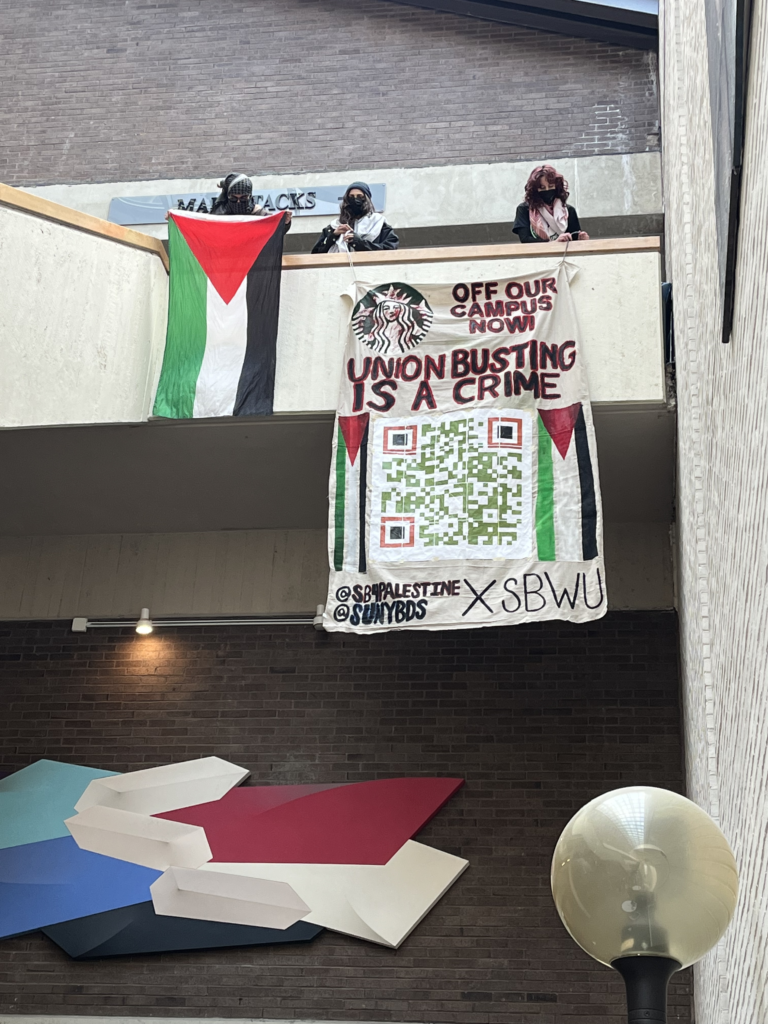
“Immediately in the Union, some of the administrators came out,” Fiaz said. “They were trying to get us out of there, they said that we couldn’t be there and that it was against school guidelines. We had the student code pulled up and cited it immediately. Eventually they left us alone.”
Within the student code, the university has a Public Assembly Policy. There are restrictions that allow the university to interfere if the assembly disrupts a university activity, jeopardizes the safety of others or obstructs movement in a building — holding a banner does not apply to any of those restrictions.
At every protest and demonstration, there is an overwhelming presence of police officers filling the area. On Tuesday, March 26, the police presence escalated, and nine protestors were arrested during a peaceful movement.
The protestors entered the public lobby of the administration building, led a few pro-Palestinian chants and then engaged in a quiet sit-in demonstration. UPD officers quickly surrounded the students and Rick Gatteau, the vice president for student affairs, announced that the students had five minutes to leave or else they would be subject to arrest on the basis of “disruption.”
Gatteau sent an email statement four hours after the arrests were made, stating that the arrests were “necessary.” He used hypocritical language priding the university on free speech. Several campus organizations including USG have called for the charges to be dropped. On April 4, USG passed a resolution to “Demand Protection of Students’ Rights to Free Speech and Peaceful Protest.” The university has not commented on it yet.
“It’s all a reminder that, as students, we need to know our rights and we need to know that we are protected under the First Amendment and the student code to have peaceful demonstrations,” Fiaz said. “What the administration is doing here and at a lot of other SUNY schools is a direct violation of the First Amendment. Censorship of this magnitude is only occurring because of our unwavering support for the Palestinian cause.” Despite the efforts of the university to silence students, groups like SB4Palestine and organizations all across the globe continue to fight for Palestine. They continue to spread the message of the over 34,000 Palestinians who have been killed and can no longer fight for themselves. To quote from the Palestinian poet Refaat Alareer, who was killed by an Israeli airstrike in December, “If I must die, you must live to tell my story.”

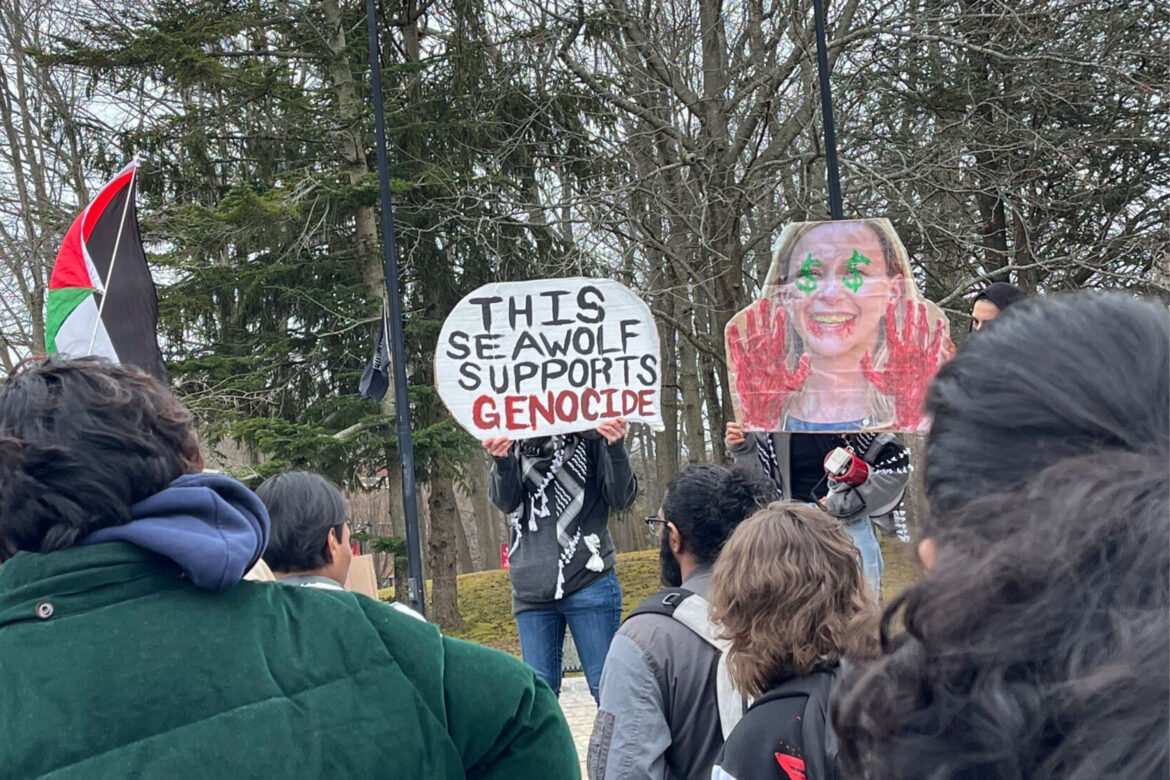
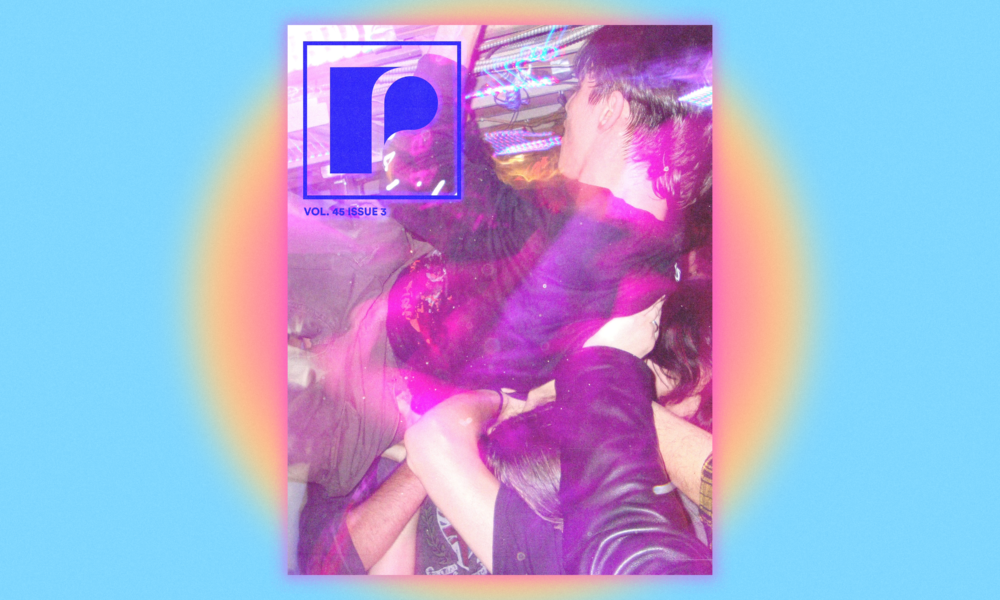
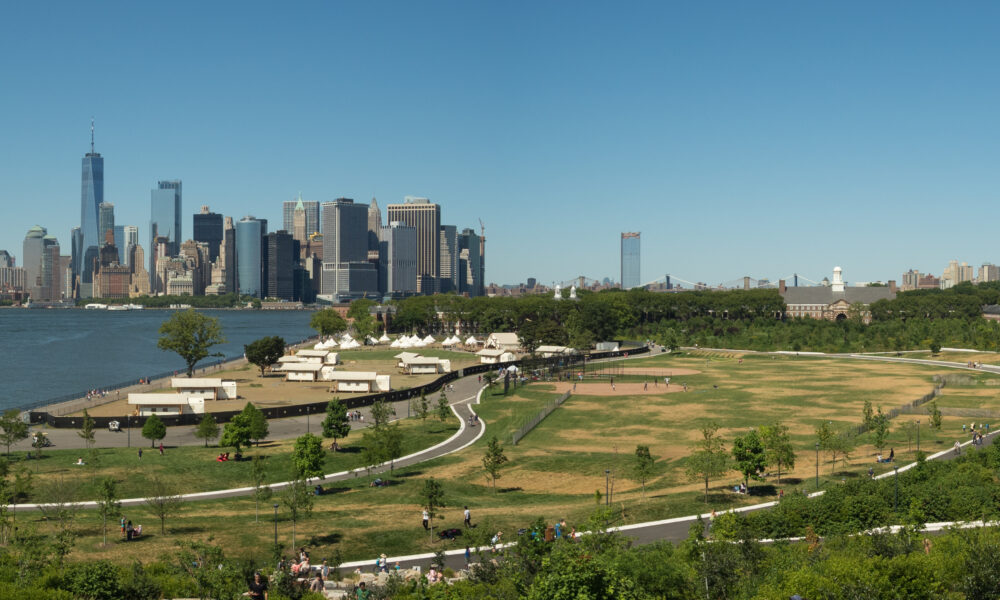
Comments are closed.